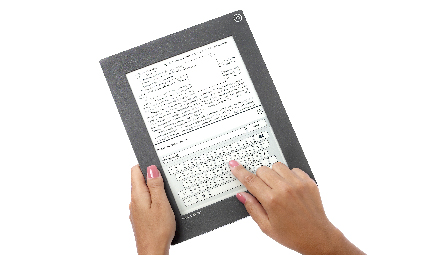University of Cambridge spin-out company Plastic Logic has launched the Plastic Logic 100 for Education, an electronic textbook designed with the needs of students and educators in mind. The device provides a more effective way for students to carry, access and review all their textbooks.
Plastic Logic CEO Indro Mukerjee officially debuted the electronic textbook at an event held at the Moscow Planetarium during a visit by British Trade Minister Lord Green. The event, organized by RUSNANO and UK Trade and Investment (UKTI), highlighted Plastic Logic as an example of the joint technology cooperation between the UK and Russia.
The Plastic Logic 100, featuring an exceptional textbook-like and safe reading experience, allows for a backpack worth of textbooks to be ready and available at a student’s fingertips at any time in an extremely lightweight package. For educators, the Plastic Logic 100 provides a simple, yet powerful tool capable of securely delivering an entire year’s worth of textbooks in one place without the risk of students not having what they need with them.
The future of education is here today. We are proud to be part of the electronic textbook programme and have received positive feedback from many school regions.
Indro Mukerjee
Based on Plastic Logic’s groundbreaking work in organic electronics and nanotechnology, the device is the first in the world to feature PlasticPaperTM technology. Because the base is not glass, the Plastic Logic 100 display is large, thin, lightweight and is uniquely shatterproof and rugged – which is especially important given constant use by students.
The light, thin, large-format reader features a display that appears like hard-copy textbooks and comes with a simple user interface that makes for an ideal studying experience. Unlike traditional computer displays, based on backlit glass displays, the Plastic Logic 100 screen is glare free and can be read even in direct sunlight. Just like a regular schoolbook, the Plastic Logic 100 can be read for long periods of time without eye strain.
Plastic Logic is now taking orders for the Plastic Logic 100 device and will make units available to schools beginning later this month. Plastic Logic has been selected as one of the vendor candidates by the Federal Institute of Development of Education (FIRO) for participation in the electronic textbook programme, which is now being prepared to roll out in selected Russian school regions.
“The future of education is here today. We are proud to be part of the electronic textbook programme and have received positive feedback from many school regions,” said Mukerjee. “We look forward to working with Russian educators and selected schools regions in this innovative education program.”
For the education program, the Plastic Logic 100 electronic textbook will come equipped with more than 40 books covering the subject matter taught in grades 6 and 7, as agreed upon with education regions to meet their learning processes. For more information about the Plastic Logic 100 electronic textbook, visit www.plasticlogic.com











